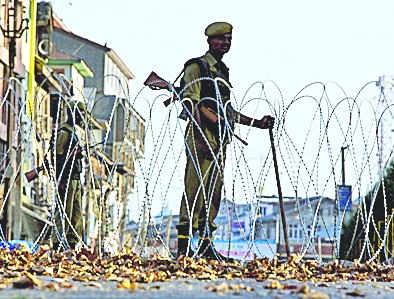
THIS UNQUIET LAND: STORIES FROM INDIA'S FAULT LINES By Barkha Dutt, Aleph, Rs 599
"Nothing, no matter how crazy, would stop me in my efforts to get a good story." So what made the seasoned television journalist and self-professed adrenaline junkie, Barkha Dutt, devote her time to penning these stories instead of reporting them? She wanted to write about the impact that her profession - the world of televised news - had had on the country since the 1990s. What stops the book from being a mere rehash of her reportage is hindsight. Besides, Dutt also throws in a few exclusives - ones that fetched her much attention from the media.
The book is most personal when Dutt talks about her early years in college. Dutt's honest admission of her naive understanding of feminism - formed mostly by reading Germaine Greer's The Madwoman's Underclothes among other such texts - is a refreshing change from the self-importance of being a "high-profile reporter" that creeps into parts of the book. Dutt's simplistic notions of feminism were challenged when she was asked to report on the gang rape of a grassroot activist in Rajasthan. Bhanwari Devi had been assaulted by a group of upper caste men while her husband had been forced to watch. Watching the stoic Bhanwari Devi refuse to give in to the tirade against her by the heads of 39 village panchayats, in spite of the disbelief that anyone but god would give her justice, was the first chink in Dutt's self-assured feminist armour.
The first time Dutt experienced war was when she was 27, in Kargil - the war which made her a household name. Never before had the television brought a battle between India and Pakistan into the interiors of the home. This changed the way that India looked at itself in building a new narrative of patriotism. Here, like in several other places in the book, the impact that Dutt's gender identity had - not only on those watching a woman report from the front line, but also on her coverage - is the theme in which Dutt's personal voice comes across as the strongest. From the army headquarters to her Delhi bosses, all had been wary of sending a woman reporter to the war front. This scrutiny made her acutely self-conscious of displaying emotions while reporting.
The frequent feeling of thanklessness in being a television journalist is another thing that Dutt writes about in almost all the chapters. From facing flak for letting journalist Sabina Saikia's husband speak on live television during the 26/11 attacks to being one of the journalists whom Narendra Modi avoids at all costs, she recounts numerous instances when the better part of the public anger had been reserved for the media. She also speaks of the most notable blot on her career, the leaked conversations between Dutt and Nira Radia, a public relations strategist for two of India's business tycoons. She says here that she was not any friendlier with Radia than she was with any other source. Her only regret from that time, says Dutt, was that she had spent too much time explaining herself yet, she uses her book to do just that.
Some of the images that still haunt Dutt were too graphic to be telecast. A beach that had turned into a mass grave of children when the sea crashed down on them during the tsunami in 2004 and the sight of a fellow journalist covered in blood, sobbing, are things that Dutt recalls with horror in spite of having seen death and destruction from close quarters all through her career.
While writing about Kashmir Dutt tries not to take sides. She recalls interviews with the idiosyncratic Farooq Abdullah, separatists, soldiers and half-widows in the same tone. The most interesting part of the chapter on Kashmir is the description of Dutt's visit to Srinagar's only psychiatric hospital. A decade or so after the insurgency erupted in the 1990s, as many as 36,696 people in the region - several militants and soldiers among them - were diagnosed with mental disorders. The demons, when they struck, made no exceptions. However, like the chapter on war, the one on Kashmir, too, tends to get repetitive. Although not unrelated to each other, Dutt's attempts at linking the clefts, which divide the country, remain unsuccessful.
Dutt writes that the anticipation of adventure is one of journalism's many blessings in her life. That she loves her profession, its risks and pitfalls notwithstanding, comes through clearly in the book. Her fascination with the profession began at an early age, as admiration for her mother, Prabha Dutt. If the underlying excitement in the narrative when talking of experiences like crossing over to Libya from Egypt illegally, is anything to go by, Dutt is right when she says, "the passion has not dimmed."










